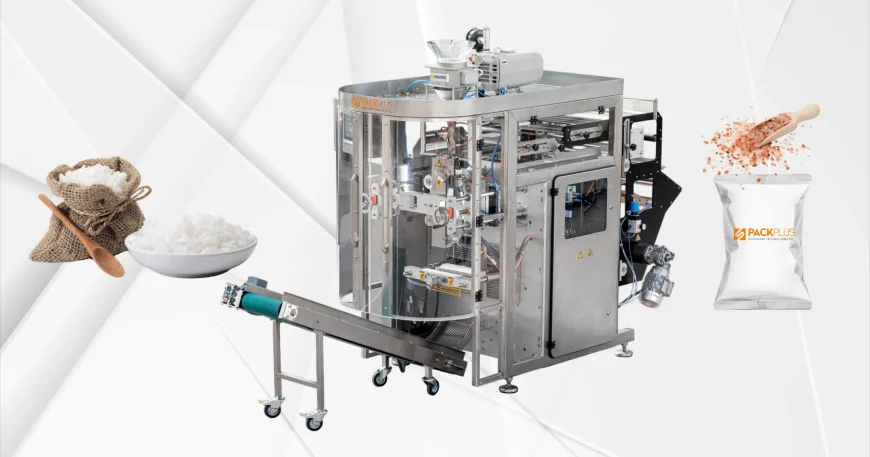Table of Contents
ToggleSalt Packaging Machine Manufacturer
Salt is one of those everyday essentials that we barely think about—but behind every neatly packed pouch on a store shelf is a carefully designed process. Whether it’s table salt, sea salt, or Himalayan pink salt, each variety needs to be packed in a way that preserves quality, ensures hygiene, and meets consumer expectations. For salt producers, this means investing in the right equipment to get the job done efficiently. In this article, we’ll explore how salt packaging machines work, what makes a good one, and how to choose a manufacturer you can truly rely on.
Full Automatic Vertical Packaging Machine
What Is a Salt Packaging Machine and How Does It Work?
A salt packaging machine is designed to do exactly what the name suggests—it packages salt. But this isn’t just about dropping salt into a bag. These machines automate every step of the process: dosing the right amount of salt, forming or handling bags, filling, sealing, and ensuring everything stays hygienic and consistent. Whether you’re working with finely ground table salt or coarse sea salt, the machine adapts to your product’s texture and flow. The salt moves from a hopper into a dosing system, gets measured precisely, and is then delivered into a bag—either formed on the spot from film roll or a pre-made pouch. The bag is sealed, often using heat, and sent off down the line, ready for boxing and shipping. Some systems even go a step further, with extras like nitrogen flushing to improve shelf life, or integrated checkweighers to make sure every pack is just right.
What Are Its Key Features and Main Applications?
Salt packaging machines come with a range of features that make them suitable for modern food production. Most models include a user-friendly touch-screen interface, stainless steel construction for food-grade hygiene, and compatibility with multiple packaging formats like pillow bags, Doypacks, and stick packs. Flexibility is key—being able to switch quickly between different product types or bag sizes without too much downtime is a major plus. The main application? Helping salt producers scale efficiently while keeping quality high. Whether you’re packaging for home kitchens, restaurants, or industrial buyers, a salt packaging machine ensures your product looks clean, consistent, and professional every time.
Salt Packaging Machine Price and Return on Investment
Let’s talk numbers. The price of a salt packaging machine can vary a lot depending on what you need. A basic semi-automatic unit might cost just a few thousand dollars, while a fully automated system with integrated weighing, sealing, and safety features can run well into five figures. But here’s the good news—these machines pay for themselves fast. For companies producing at moderate to high volumes, the return on investment is often seen within 12 to 24 months. You’re saving on labor, reducing waste, and boosting production speed. Plus, with fewer errors and less downtime, the long-term gains in efficiency and consistency are hard to ignore. Some manufacturers even offer financing or leasing plans, making it easier to get started.
What Are the Advantages of an Automatic Salt Packaging Machine?
Going automatic is a game-changer. An automatic salt packaging machine handles thousands of packs a day without breaking a sweat. It cuts down on manual labor, minimizes dosing errors, and speeds up your production line dramatically. And because the process is closed and controlled, hygiene is much easier to maintain. These machines are built to be operator-friendly, too—think touchscreens, easy cleaning, and intuitive controls. If you’re producing at scale, the consistency in weight, seal integrity, and visual presentation makes a big difference in how your brand is perceived. Plus, many systems can be connected to other production or ERP systems, helping you track output and efficiency in real-time.
How to Choose the Right Salt Packaging Machine for Your Production?
Choosing the right salt packaging machine is all about matching technology to your needs. Are you working with fine, dry table salt? Or maybe a damp, coarse sea salt that needs special handling? Do you need small retail bags, large industrial sacks, or something in between? Think about your production volume, the types of packaging you want to offer, and the flexibility you may need in the future. Also consider the available space in your facility—some high-capacity machines can be quite large. The best advice? Talk to an experienced supplier who understands your industry. They can walk you through options and help design a solution that grows with your business.
Custom Packaging Solutions for Different Types of Salt
Although salt may seem like a single product, it actually comes in many different forms, each with its own unique characteristics in terms of production and packaging. Varieties such as table salt, sea salt, rock salt, Himalayan salt, or brine salt differ significantly in grain size, flowability, and moisture content. This means that the packaging process requires specialized solutions for each type. For example, fine refined salts are best handled with high-precision screw or vibratory dosing systems, while coarse sea salts are more efficiently packaged using multi-head weighers. Additionally, since certain salt types are prone to clumping due to moisture, extra precautions such as high-quality sealing and nitrogen flushing may be necessary. At Packplus, we provide flexible and reliable packaging solutions tailored to the specific requirements of different salt types—supporting producers at every stage of their operation.

Critical Factors to Consider in the Salt Packaging Process
Salt isn’t the easiest material to package. It’s hygroscopic—meaning it absorbs moisture from the air—so your packaging line has to be up to the challenge. Machines must create airtight seals to prevent clumping, and the materials used should have excellent moisture barrier properties. Accuracy is another big deal. Even a small deviation in weight can affect your product margins or create compliance issues. On top of that, machines should be easy to clean, food-safe, and efficient to operate. Adding components like metal detectors, checkweighers, and automatic rejection systems boosts quality control and consumer safety. In short, every detail matters if you want to deliver a top-tier product.
How to Select the Best Salt Packaging Machine Manufacturer?
Finding the right machine is important—but finding the right manufacturer? That’s just as critical. You want a partner who offers more than just hardware. A good salt packaging machine manufacturer should provide responsive support, reliable spare parts, training for your team, and a real commitment to long-term success. Ask about their experience in the food sector, and don’t hesitate to request case studies or references. Do they offer customized configurations? Can their machines integrate with your existing production line? Do they understand your export requirements, labeling needs, and technical compliance? At Packplus, we specialize in building efficient, tailored salt packaging machines that not only meet but exceed expectations. With strong technical support and a customer-first approach, we’re here to help your business grow.



